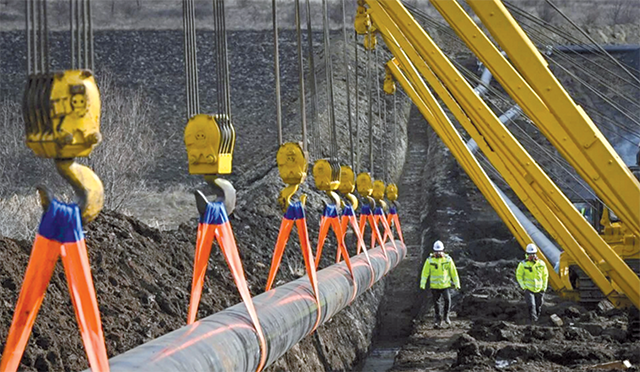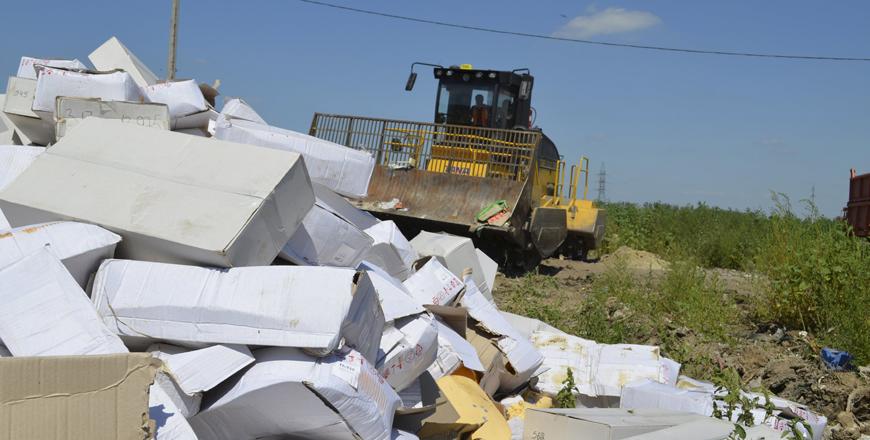You are here
Russian farm sector needs 13b euros due to sanctions
By Agencies - Aug 23,2014 - Last updated at Aug 23,2014
MOSCOW — Russia's farm sector needs an additional 636 billion rubles ($17.6 billion, 13.2 billion euros) of investment to replace the products it banned in response to Western sanctions, Agriculture Minister Nikolai Fyodorov said on Friday.
"We prepared a reasonably optimistic scenario of the sector's development that foresees additional financing of not one trillion, but just 636 billion rubles from 2015 through 2020," the minister was quoted as saying by the state-run RIA Novosti news agency.
Russia earlier this month imposed sweeping bans on food from the United States, the European Union (EU) and a handful of other countries in response to Western economic sanctions.
The trade war is part of a broader crisis in East-West relations sparked by Russia's perceived attempts to split strife-torn Ukraine in two after Kiev's decision to seek a closer political and economic alliance with Europe.
Officials expressed confidence at the time that Russia would be able to make up for the shortfall with imports from Latin American and other allied countries as well as additional investments in its own agricultural sector.
But the cost of doing so is only now becoming clear. The figure cited by Fyodorov is as much as three times a recent estimate from Deputy Prime Minister Arkady Dvorkovich.
Russia relies heavily on foreign fruit and vegetables because its long winters and inhospitable climate keep farmers from growing produce desired by the country's booming middle class.
It imports huge volumes of Australian and European meat along with US poultry and Norwegian salmon — all banned under Russian President Vladimir Putin's orders earlier this month.
Russia also depends to a large degree on foreign seeds for the foods it does grow.
While the Russian government has considerable revenue from oil and gas exports, the slowing economy and uncertainty has nearly choked off growth.
Separately, Russia has lifted a ban on dairy imports from two firms in Serbia, the government's food health service said on Saturday, in an apparent attempt to woo the EU membership candidate amid Moscow's stand-off with the West.
The veterinary and phytosanitary service Rosselkhoznadzor said on Saturday that it has included two Serbian firms in the list of the companies which are allowed to sell dairy produce to Russia and its Customs Union with Belarus and Kazakhstan.
It said the firms had previously been banned for unspecified breaches of food regulations on a recent, unspecified date.
The service has lifted the ban just as the EU has asked new candidates, including Serbia, not to exploit the Kremlin's ban on Western food imports.
"Why now? Maybe the Serbs want to use the current situation and get into the [Russian] market as far as it can get," a spokesman for the service told Reuters.
Some Serbian food producers, particularly fruit farmers, have reported a spike in demand from Russia, but capacity is limited. In 2013, just 7.2 per cent of Serbia's total exports worth some $65 million, went to Russia.
Serbia said it would honour a call from Brussels not to profit from Russia's ban on Western food — but stopped short of saying it would curb its own exports.
Prime Minister Aleksandar Vucic said his government would not intervene to stop Serbian farmers from shipping their produce to Russia as that would be "contrary to the interests of the state".
But he pledged to "comply with the EU recommendations" and not provide any subsidies to Serbian producers to help them boost exports to Russia.
Serbia's food and agriculture exports to Russia totalled $117 million in the first half of the year, according to official figures.
Agriculture Minister Snezana Boskovic Bogosavljevic, who has been in Moscow for talks meat and dairy trade talks, said that represented just 0.2 per cent of Russia's annual food imports.
"Even if Serbia reaches a peak of its export to Russia, it would be only 0.4 to 0.5 per cent of Russian imports, an insignificant percentage that threatens no one," she said.
Last week Russia said it will allow imports from neighbouring Belarus and Kazakhstan of food processed from Western raw materials.
"Our Customs Union colleagues can win in this situation because some products, which were previously coming to us directly, will be processed there," Russian news agencies quoted Dvorkovich as saying.
A duty-free Customs Union was set up this year by Russia, Kazakhstan and Belarus to boost economic ties and trade.
Russian Prime Minister Dmitry Medvedev said he hoped Western food import bans would not last too long.
Belarus and Kazakhstan said they will continue to import food banned by Russia but Minsk has said it will make sure sanctioned goods do not cross into Russia.
However, since Moscow announced the bans some traders have been looking for ways to sidestep them.
Last year, Russia imported $17.2 billion worth of food from the countries covered by the sanctions, of which $9.2 billion was in the affected categories, according to the International Trade Centre, a joint venture of the United Nations and World Trade Organisation.
Related Articles
BELGRADE — A pipeline connector between Serbia and Bulgaria that will reduce Serbia's dependance on Russian gas by giving it access to Azerb
Egypt has resumed talks about the creation of a free trade zone with the customs union of Russia, Belarus and Kazakhstan, Egyptian and Russian officials said on Wednesday.
MOSCOW — Russian officials on Thursday steamrollered tonnes of cheese as they began a controversial drive to destroy Western food smug


















